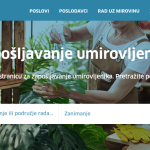ZAGREB, March 30, 2019 – Human Rights Ombudswoman Lora Vidović submitted to parliament on Friday a report for 2018 which says the biggest challenges Croatia encountered last year were discrimination on ethnic, age and income grounds, a higher poverty risk rate, notably for the elderly, citizens’ strong distrust of institutions, and emigration.
Last year, when Vidović’s office processed 5,082 cases, the number of citizen complaints rose 8.6% on the year. Twelve percent were about discrimination, 11% about work relations, and 10% about the justice system and healthcare.
The largest increase (70%) was recorded in the number complaints about the protection of the rights of war veterans and their families, notably regarding veteran status, material and other rights. The largest decrease (40%) was recorded in the number of complaints about distraint, property rights relations, reconstruction and housing.
In 2018, as in previous years, the largest number of complaints came from the county and city of Zagreb, followed by Primorje-Gorski Kotar, Split-Dalmatia and Sisak-Moslavina counties.
Work and employment accounted for the largest number of complaints (42.9%), often about age discrimination and union membership in the private sector as well as about political affiliation in the public sector. Of said complaints, 27.1% were about discrimination at work and 15.8% about hiring.
Despite a labour shortage, citizens pointed to irregularities in hiring, fixed-term employment contracts, unlawful and unpaid overtime, inadmissible dismissals, salary payment irregularities as well as harassment at work. Many of those who complain do not know how to protect their rights. There is also fear of victimisation, so people contact Vidović’s office anonymously.
In 2018, grounds for discrimination were consistent with previous years, with race, ethnicity, and skin colour being the most cited. Roma, Serbs and migrants submitted 20.8% of all complaints.
Roma remain faced with obstacles in education, employment, housing and healthcare as well as with social exclusion and prejudice.
Members of the Serb minority are also more strongly exposed to ethnic discrimination and the relationship of the public majority and some political and public stakeholders towards this community has been deteriorating for years, the report says.
Vidović’s office continues to receive complaints from migrants and associations which point to difficult access to international protection, lack of systematic application of integration measures, and police violence towards migrants who illegally cross the border, which is not being efficiently investigated, the report adds.
More news about human rights in Croatia can be found in the Politics section.







